| |
|
This interview with Bob
Dix (1935-2018) was originally available exclusively to subscribers of 007
MAGAZINE OnLine as part of
007 MAGAZINE Issue #50 in November 2006. The article was later
included in 007 MAGAZINE
FILES Live And Let Die File #1 in March 2011, and later available
as part of 007 MAGAZINE OMNIBUS #7
with different images. |
 |
|
STEVE OXENRIDER in conversation with Live And Let Die’s CIA agent Hamilton.
Robert (Bob) Dix comes from a
proud tradition of acting talent. His father, Richard Dix, was a major
leading man at RKO Radio Pictures in Hollywood from 1929 through 1943.
During the silent era Richard Dix played cowboys, clean-cut American
heroes and Red Indians (Native Americans), most notably in the epic The
Vanishing American (1925). In 1931 he won a Best Actor Academy Award
nomination for his performance as the idealist Yancey Cravat in Cimarron.
His son, Bob, was born an identical twin to
Richard Jr. Bob Dix’s early career as an American character actor included
a wide range of musicals, romances, swashbucklers and many Westerns, among
them Young Jesse James. His friendship with Roger Moore started back in
the mid-50s when both he and Moore were under contract to MGM Studios in
Hollywood. Dix appeared with Moore in Interrupted Melody (1955),
The King’s Thief (1955) and Diane (1956). In 1956 he also
played Grey in the sci-fi classic Forbidden Planet. In 1969-1970
Bob teamed with cult horror/crime director Al Adamson to make five movies,
including Five Bloody Graves, in which he starred as well as served
as associate producer and screenplay writer. |
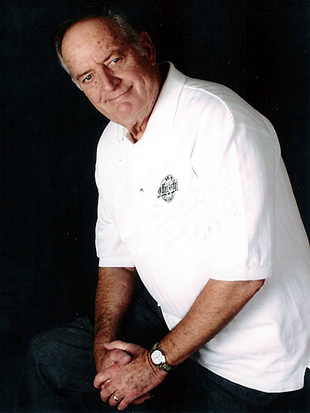 |
|
|
In the early 70s Bob Dix
was travelling extensively, writing, producing and making distribution
arrangements for independent film productions. 1972 found Bob in Slidell,
Louisiana, where he had gone to do research on alligator wranglers. To
gain insight into the lifestyle and secrets of these gator hunters, Bob
got a job tending bar in a honky-tonk called ‘The Happy Hour’. He was soon
dubbed ‘Bob the Bartender’ by the locals. “As a writer of screenplays, I
had learned tending bar was like being in a confessional - a great way to
get information. I was in the area when Roger and the production company
of Live And Let Die arrived in New Orleans (October 1972). I saw
his picture in the local paper and called him at his hotel.” |
|
 |
The next day Roger
introduced Bob to director Guy Hamilton. “Guy discovered that the local
actor hired to play CIA agent Hamilton was afraid to do the sequence in
the streets of New Orleans. The crowd scared him. He froze up. Guy
Hamilton asked me to step in and play the part.”
The pre-title sequence of
Live And Let Die features one of the most clever and bizarre deaths
in the entire 007 series. CIA agent Hamilton, in the French Quarter of New
Orleans on the trail of the evil Dr. Kananga, watches as a funeral
procession of pallbearers and mourners, accompanied by a brass band,
approaches.
“Whose, er… funeral is
it?” Hamilton casually inquires of a small black man [veteran jazzman
‘Kid’ Thomas Valentine (1896–1987) in a cameo role]. “Yours!” comes the
reply as the assassin stabs Hamilton in the stomach. Hamilton falls into
the street, the coffin is lowered over his body and in seconds it is
‘swallowed mechanically’ through the bottom of the coffin. The solemn
dirge of the brass band gives way to jazz as the mourners break into dance
and the coffin is carried off down Bourbon Street. |
|
|
|
|
|
To film the scene, a
coffin was purchased at a nearby funeral parlour, the bottom removed and
the interior properly rigged. Bob recalls, “It had rungs under it, front
and back. They dropped it over me in the street, I hooked my feet on the
back rung and pulled myself up on the front rung and hung there out of
sight. The ‘pall bearers’ carried me off down the street. I hung inside
until I heard ‘Cut’. It was like holding a ‘chin up’ when doing a pull up
exercise.”
The weather was not in
Dix’s favour during the four-day shoot. “We were half way through with the
killing of my character, Hamilton, and it started to rain. We had to stop
production after a day and a half into the sequence. As you know, you
cannot start shooting a sequence in ‘hard light’ and finish in the rain.
It won’t edit together. So we had to start over after the storm passed.” |
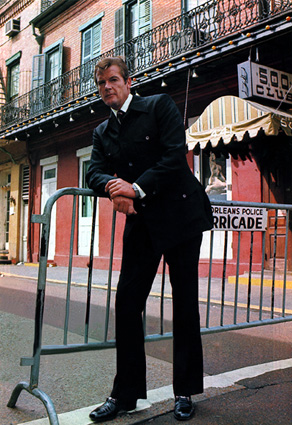 |
|
Roger Moore on
Bourbon Street, New Orleans |
|
|
|
|
Bob recounts working
alongside legendary greats Cameron Mitchell, Jack Nicholson and, on five
separate occasions, opposite John Carradine. “John was the Actor’s actor.
He could read a page of dialogue once and know his lines. He told me the
story of his early days in Hollywood. ‘People used to think I was part
vampire,’ John said, ‘because I only went out at night. The truth was I
owned only one set of clothes and it was a tuxedo!’”
Bob continues, “In
Cain’s Cutthroats (1971) John played a preacher who was also a bounty
hunter. The last day of principal photography we kept shooting from day
for day into night for night. We had been working almost 24 hours and were
on the last scene. To combat the cold of the night, John had been nipping
on some brandy. In fact, he seemed quite tipsy. But when he was called to
perform in the exterior scene on a western street with lots of dialogue,
he didn’t miss a beat. When the director called ‘Cut. Print!’ John just
about fell over. On the screen, as an audience, you would never have known
his condition.”
|
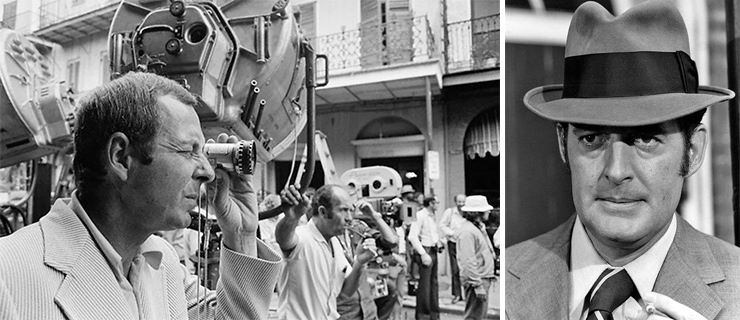 |
|
ABOVE: (left) October 26, 1972 Live And
Let Die director Guy Hamilton sets up a shot for the first of
two jazz funerals filmed on Bourbon Street, New Orleans. (ight)
American actor Bob Dix as CIA Agent Hamilton in Live And Let
Die (1973). |
|
|
|
Bob Dix left Hollywood
and acting in the mid-70s. Since then, he and his wife, Mary Ellen, have
become active in celebrity collectibles shows and as guest presenters at
film festivals across the U.S. Bob is also very involved in community
work, in particular sharing his understanding of the Bahá’í World Faith
throughout the Los Angeles area. In 1989 he was invited to the Native
American Film Festival in Gallup, New Mexico as guest speaker for the
first screening in over 60 years of his father’s silent movie Redskin,
one of the earliest sympathetic portrayals of the Native American. |
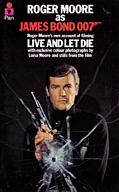 |
|
Roger Moore's
1973 diary of the filming of Live And Let Die. |
|
Roger Moore and Bob Dix
remain close friends today*. “Roger was and is a professional,
well-prepared actor. We had a good time working together and remembering
our youth. I’m really proud of the good work he is doing for UNICEF.”
In the book
Roger
Moore as James Bond, his 1973 published diary account of filming
Live And Let Die, Moore remembers reuniting with Bob in New Orleans.
“My mother would be absolutely gaga if she could see Bob Dix because he
looks exactly like his father who was her favourite screen heart-throb.
When I was a child she used to take me to see all his pictures.” Years
earlier Bob had presented Lily Moore with a framed 1-sheet poster of
Richard Dix’s 1939 western classic, Man of Conquest. “The poster
held a place of honour over her fireplace in England until the day she
died,” Bob recalls fondly. |
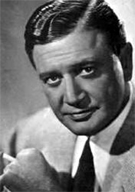 |
|
Richard Dix
(1893-1949) |
|
|
|
*Editor's note:
Since this article was written both Roger Moore and Bob Dix have passed
away. Roger Moore died at his home in
Switzerland on May 23, 2017. Bob Dix died on August 6, 2018 in Tucson,
Arizona, aged 83. It should also be noted that British based American
actor Shane Rimmer provided the
voice of Bob Dix in Live And Let Die when CIA agent Hamilton says the line “Whose, er… funeral
is it?” |
|
